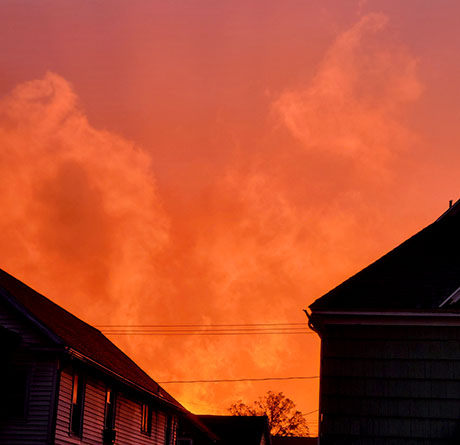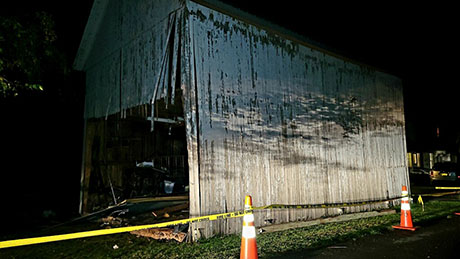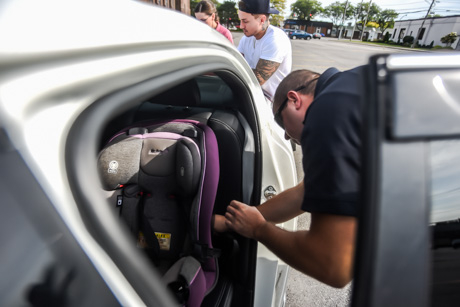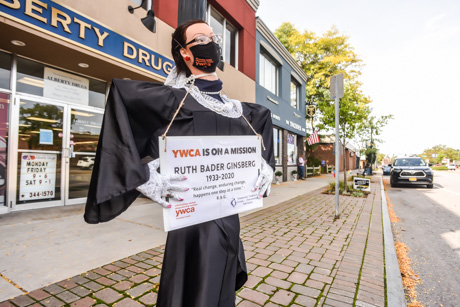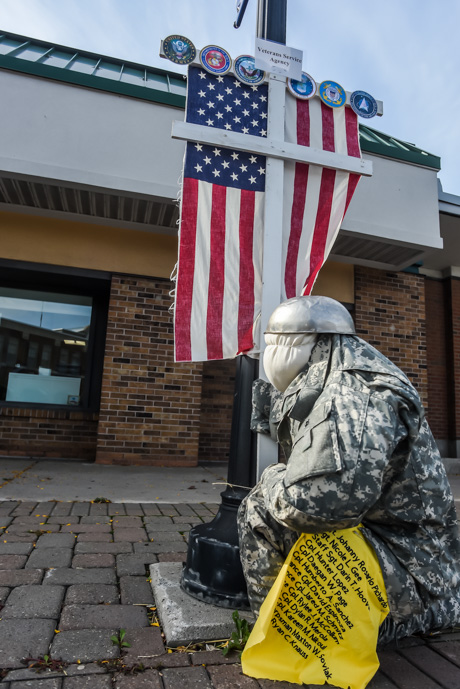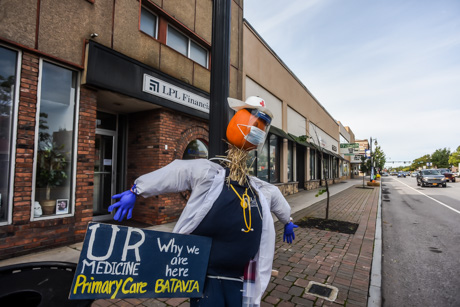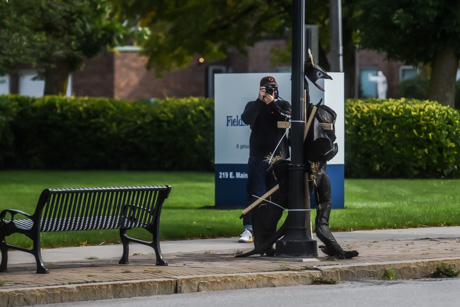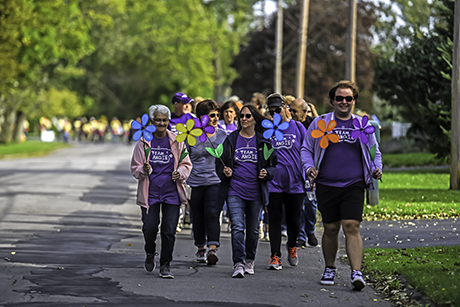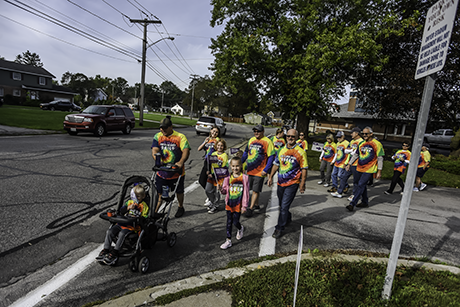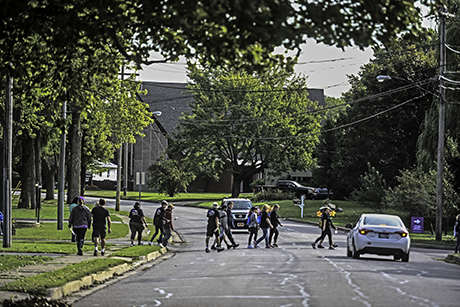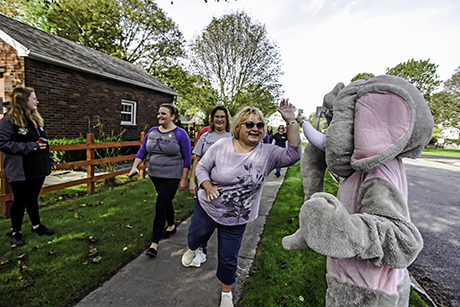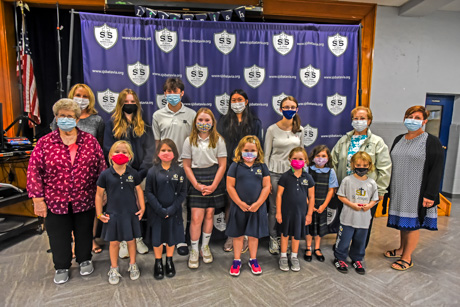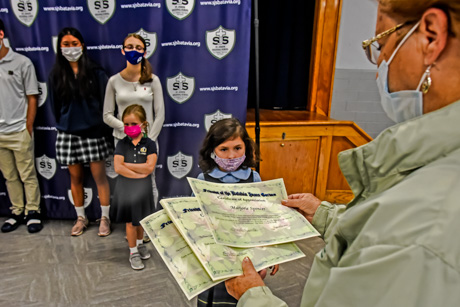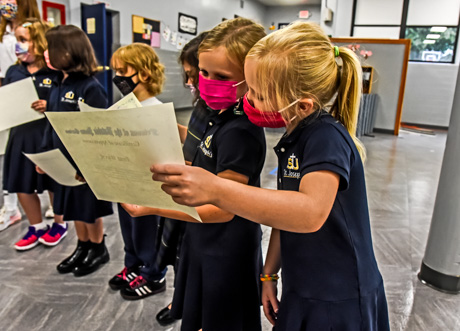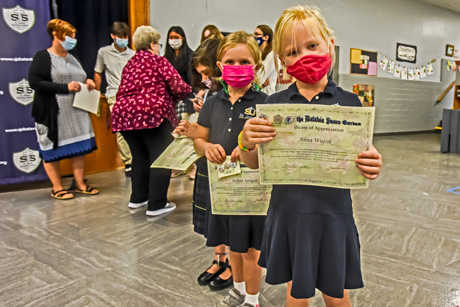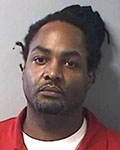Village of Oakfield threatens lawsuit, withholding fire protection over payment dispute with Town of Oakfield

Update: 9:00 p.m., Sept. 28
Sean Downing, chief of the Oakfield Volunteer Fire Department, left a phone message stating that he is "hopeful that both parties can come and resolve their differences before the November 30th deadline."
"If not, then by written order of the mayor or the board of trustees of the Village of Oakfield, we will not be able to respond into the town, which includes the elementary and the high school -- and that is per consulting with our attorney, Mark Butler."
-------------
Update: 5:50 p.m., Sept. 28
Oakfield Town Supervisor Matt Martin called back to The Batavian, but didn't not want to elaborate other to say that the matter is in the hands of the town's attorney.
-------------
The Village of Oakfield is preparing to take legal action against the Town of Oakfield – as well as threatening to withhold fire protection – if the town does not pay the nearly $80,000 it owes to the village as directed by a longstanding joint municipal agreement for such services.
That’s the message conveyed by Village Mayor David Boyle during an interview on Monday with The Batavian.
Boyle said a letter articulating the village’s position is being included in residents’ water/sewer bills this week.
The mayor said the dispute centers upon the town’s refusal to pay $78,648 owed to the village for the 2020-21 fiscal year ending May 31.
Contending that the town is “holding the village hostage” in hope of renegotiating the shared services arrangement, Boyle said the village board has instructed its attorney to file a lawsuit to recover the 2020-21 payment. He also said the town has yet to pay for the first three months of the 2021-22 fiscal year.
The letter, which also is signed by Deputy Mayor John Igoe and Trustees Michael Cianfrini, Michele Graham and John Mullen, states, in part:
“The Village Board is united in recognizing that the village cannot burden village residents and businesses with providing fire protection to the town without reimbursement. Therefore, the board has directed a letter be sent to the Town stating that effective Nov. 30, 2021, the Village will no longer be able to provide fire protection to the Town with the exception of the Oakfield-Alabama Central School.”
Boyle said the village owns fire trucks and equipment, and runs the fire service through the Oakfield Volunteer Fire Department, which owns the building on Albert Street.
“The town buys services (coverage) from us,” he said. “For years and years, we’ve had an agreement with the town about purchasing fire protection from the village. For as long as I remember, there have been contracts in place that basically are the same structure year after year after year.”
The current structure has the village paying 42 percent of the cost and the town paying 58 percent. Boyle said that the town is looking for a 50/50 split.
While that may seem equitable on paper, Boyle said, when broken down by assessed valuation, village residents pay $1.62 per $1,000 of assessed value in taxes while the town residents pay 60 cents per $1,000 of assessed valuation in taxes.
“Our village residents have to work twice as hard to pay their bill, yet the town is saying we don’t find what you’re charging acceptable and we want to move some of that cost over to the village,” Boyle said. “They’ve held back the payment to force us to make an agreement that we don’t believe we can do in the best interest of the village residents and providing a sustainable fire service.”
Per the 2020 census, the Town of Oakfield has 3,145 residents, with 1,812 of those people residing in the village.
Boyle said the fire department budget is around $175,000 including Workers’ Compensation premiums that the town traditionally has paid and liability insurance that the village traditionally has paid. The fire protection agreement is based on $135,600, with the village responsible for $56,952.
He also said this hasn’t been an issue in the past.
“Two years ago, committees got together for budgeting the fire department – looking at the long range plan and controlling costs as much as we could while also being able to sustain it over the years,” he said.
Boyle said both municipalities are required by law to provide fire protection to its businesses and its residences.
“They (the town) knew what their bill was going to be and they’ve gone out and collected tax money for that, but they haven’t signed a contract for the fiscal year that passed, even though they have collected money from the taxpayers,” he advised. “It’s escalated as it has gone on the past 15 months, but what they are saying is that it’s too expensive and they have to drive their costs down.”
He did say that there is no signed contract for 2020-21.
As far as legal action, Boyle said one of the trustees contacted the state Comptroller’s office, and the village board feels good about its chances of winning a lawsuit.
“We feel the town knew what the bill was going to be, they collected taxes on it and we provided a service in good faith. Plus, they never contacted us, saying we shouldn’t be doing that because we don’t have a contract. We’re confident that we would prevail in a lawsuit because of those reasons.”
Boyle mentioned that five fire calls over the past year or so have been structure fires in the town and, as required, the village fire department volunteers responded.
A call this morning seeking comment from Oakfield Fire Chief Sean Downing has yet to be returned.
Oakfield Town Supervisor Matt Martin has yet to respond to email and phone requests for comment.
Meeting minutes from the June 8th Town Board meeting indicate the agreement with the village is “not a contract, but a service agreement” and that a counteroffer to the village has been proposed:
“For years, but recently the past few months Supervisor Martin and Councilperson (Carol) Glor have been trying to negotiate with the Village a service contract that is equal. Currently, the Town pays 58% of the fire budget. Supervisor Martin requested that the number become a 50/50 split over a three year period, which the Mayor and Village Board refuse to entertain.
At this time the Town has not paid the village for the last village budget year. Supervisor Martin says this is not a contract it is a service agreement and should be treated as such. A proposal to the Village of $63,000.00 per year for three years on a service contract appears to be rejected as there has not been any communication from the Mayor.”
Boyle, after hearing what was communicated, said, “We’ve always been willing to talk with the town, maybe not in their time frame.”
“I got the sense that they’re not paying the contract and using that as hostage money. We want to treat it as two matters: They clear up what they owe us and then we’ll talk about going forward. We provided a service to them in good faith, so we believe that they’re being disingenuous.”




